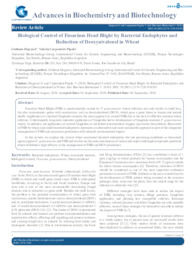Biological control of fusarium head blight by bacterial endophytes and reduction of deoxynivalenol in wheat.
Biological control of fusarium head blight by bacterial endophytes and reduction of deoxynivalenol in wheat.
Autoria: DEGRASSI, G.; CARPENTIERI-PIPOLO, V.
Resumo: Fusarium Head Blight (FHB) is predominately caused by F. graminearum whose infection not only results in yield loss, but also contaminates grains with mycotoxins, such as deoxynivalenol (DON), which pose a great threat to human and animal health. Application of chemical fungicides remains the main approach to control FHB due to the lack of effective resistant wheat cultivars. Unfortunately, long-term intensive application of fungicides led to development of fungicide-resistant F. graminearum strains. In addition, the application of several fungicides at sub-lethal concentrations triggers mycotoxin biosynthesis. Biocontrol of FHB by wheat associated bacterial endophytes represents an alternative and more sustainable approach as part of the integrated management of FHB and mycotoxin production with reduced environmental impact. In this review, we explore the current wheat associated bacterial endophytes that are promising candidates as biocontrol agents against F. graminearum and FHB and we discuss the main mechanisms of action and major antifungal compounds produced which exhibited a high efficacy in the management of FHB and DON production.
Ano de publicação: 2020
Tipo de publicação: Artigo de periódico
Unidade: Embrapa Trigo
Observações
1 - Por padrão são exibidas publicações dos últimos 20 anos. Para encontrar publicações mais antigas, configure o filtro ano de publicação, colocando o ano a partir do qual você deseja encontrar publicações. O filtro está na coluna da esquerda na busca acima.
2 - Para ler algumas publicações da Embrapa (apenas as que estão em formato ePub), é necessário ter, no celular ou computador, um desses softwares gratuitos. Sistemas Android: Google Play Livros; IOS: iBooks; Windows e Linux: software Calibre.
Acesse outras publicações
Acesse a Base de Dados da Pesquisa Agropecuária (BDPA) para consultar o acervo completo das bibliotecas da Embrapa.

